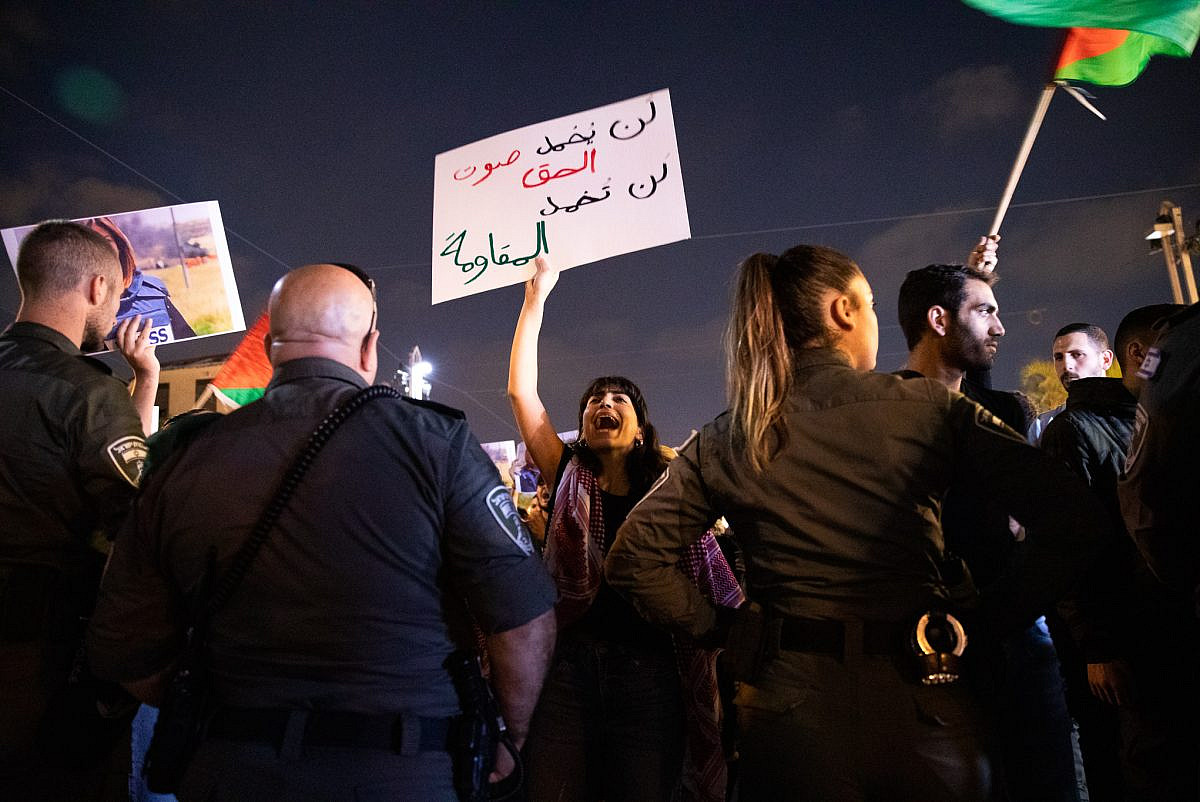In the shadow of the Hamas-led October 7 attack and Israel’s ongoing bombardment of the Gaza Strip, Palestinian citizens of Israel have been facing a wave of persecution. Hundreds have been arrested or interrogated, usually on the basis of social media activity; dozens more have been suspended or dismissed from Israeli academic institutions; and a recent amendment to Israel’s Counterterrorism Law is enabling unprecedented levels of surveillance.
At the same time, a more subtle but equally dangerous move to further cast the community as “internal enemies” has gone largely under the radar: since October 7, Israel has placed seven Palestinian citizens in administrative detention.
Israel has routinely used administrative detention to arbitrarily incarcerate Palestinians in the occupied territories — who are subject to Israeli military rule — for months or even years on the basis of “classified” evidence, without the need for standard legal proceedings like presenting charges or holding a trial. Before the war, there was already a higher number of administrative detainees — over 1,300 — than at any time in the previous three decades; now, that figure has more than doubled.
But this practice has very rarely been used against Palestinians with Israeli citizenship since the lifting of military rule inside the state in 1966. In fact, according to Nareman Shehadeh-Zoabi, a lawyer at the Haifa-based legal center Adalah, there were only four known such cases in recent years: three during the Palestinian uprising of May 2021 that became known as the “Unity Intifada,” and a single case before that.
Earlier this year, Israeli National Security Minister Itamar Ben Gvir raised the prospect of using the measure more widely against Palestinian citizens, ostensibly to crack down on the plague of organized crime and gun violence within Arab communities in Israel. Human rights organizations and civil society groups strongly objected to those proposals at the time, fearing that the Israeli authorities would inevitably expand the use of administrative detention beyond the fight against crime.

While Ben Gvir didn’t initially get his wish, the authorities are now using the measure more than ever against Palestinian citizens, with the current Gaza war providing the justification. In recent weeks, two Palestinians from Umm al-Fahem, one from Qalansawa, three from Arraba and Sakhnin, and one from Majd al-Krum have all been incarcerated using administrative detention.
“It started with three detainees about a month and a half ago, and now we’re talking about seven,” Sawsan Zaher, a human rights attorney representing the three detainees from Arraba and Sakhnin, told +972 and Local Call. “It’s a very worrying escalation.”
Hussein Manna, a lawyer representing another of the detainees, described this as “a new wave of repression against Arab society. Ordinary activities are now suddenly linked to anti-terrorism laws or accusations of incitement to terrorism. Standard arrests have decreased because it is difficult for the police to justify them, so that makes administrative detention a useful tool, because security forces don’t have to present any evidence.”
‘Preventing Arab society from raising its head’
On Dec. 5, Jaber Mahajneh was arrested by the Shin Bet, Israel’s domestic intelligence agency, in the northern city of Umm al-Fahem. According to his lawyer, Raslan Mahajneh (no immediate relation), he was set to be released after a week in jail. However, Mahajneh then received an order, signed by Defense Minister Yoav Gallant, to place him in administrative detention.
“From the materials we were allowed to see, there are no real reasons for this arrest,” the lawyer explained. “He is a religious man who writes religious texts. They said they found texts in his house talking about jihad, although these are ordinary texts from the Qur’an and religious books. Even the judge did not believe that there was serious evidence against the detainee. But because the country is at war, he approved administrative detention on [Jaber] for three months, and said that if the circumstances of the war change, the issue can be reexamined.”

While the detainees from Umm al-Fahem, Sakhnin, and Arraba were all arrested on grounds relating to their religious piety, Majd Sagir from Majd al-Krum was arrested over the accusation that he was in contact with the Popular Front for the Liberation of Palestine (PFLP) — a Palestinian political party that Israel considers a terrorist group. No evidence was presented to back up this accusation.
“They claim there is no suspicion [that he committed a crime], but that it is likely that he intends to, and so not arresting him will harm the state’s security,” Manna, who is Sagir’s attorney, explained. “And of course, under the pretext of war and a state of emergency, the court immediately approved the detention despite our claim that it violates his rights as a citizen — that citizens cannot be arrested and kept in extended detention if they have not broken the law. But this argument was to no avail.”
Israel’s use of administrative detention as a supposedly “preventive” measure is particularly common. “The whole idea of it is illegal — preventive detention without qualifying evidence,” said Adalah’s Shehadeh-Zoabi. She likened it to believing that you could “enter a person’s head, know his intentions, and stop him” before he commits a crime. This, she added, is how Israel acts toward Palestinians in the occupied West Bank, as a way of “criminalizing the enemy.”
Most read on +972
Zaher believes that there could be a connection between the current wave of administrative detentions and reports following the May 2021 uprising, including one by the State Comptroller, that Israel’s police had profoundly failed to prepare for and handle the events that unfolded during those weeks. “All the arrests under the pretext of incitement since the beginning of the war, including these administrative detentions, as well as other oppressive measures, aim to prevent Arab society from protesting,” she explained. “Their goal is to not repeat the events of 2021.”
Shehadeh-Zoabi agrees. After the 2021 uprising, she said, the Israeli authorities filed 16 indictments on charges of incitement; since October 7, they have filed over 70. “It is clear that Israel is trying to strike a preemptive blow and prevent Arab society from expressing its opinions, demonstrating, and raising its head. [Israel is] treating its citizens as enemies and putting them in administrative detention without evidence. This is a new era.”
Mahajneh believes this trend is set to continue. “They can now arrest whomever they want without any problem, and in light of the current context, we expect there to be more arrests in the near future.”
A version of this article was first published in Hebrew on Local Call. Read it here.






